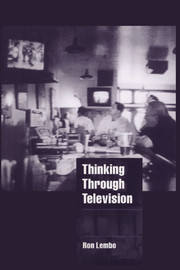Book contents
- Frontmatter
- Contents
- Acknowledgments
- Introduction: Situating my experience with television
- PART I Conceptions of television use
- PART II Reconceptualizing television use
- 4 Sociality and the problem of the subject
- 5 Components of a viewing culture
- PART III Documenting the viewing culture
- Conclusion: The politics of television reconsidered
- References
- Index
5 - Components of a viewing culture
Published online by Cambridge University Press: 22 September 2009
- Frontmatter
- Contents
- Acknowledgments
- Introduction: Situating my experience with television
- PART I Conceptions of television use
- PART II Reconceptualizing television use
- 4 Sociality and the problem of the subject
- 5 Components of a viewing culture
- PART III Documenting the viewing culture
- Conclusion: The politics of television reconsidered
- References
- Index
Summary
The social experience of people who watch television has not been conceptualized or documented adequately by social theorists, social scientists, or, more recently, by cultural studies analysts. In contrast to earlier sociological views, cultural studies does, in fact, accord television watching a legitimate place in its account of power, but it fails to adequately theorize the context of television watching as a new and distinctive cultural form. While cultural studies tends to examine texts as exemplars of ideology or discursive power, understanding them in terms of the social and historical conditions under which they are produced, I argue that, unless critical analysts generate categories of reception, of use, that can document the social function of television, the emphasis on textual reading among audience members remains incomplete and perhaps misses what is arguably most important about television use.
I use the construct of sociality to incorporate and move beyond ideas about discourse and textuality, and to systematically explore how television is used in ways that allow me to focus on more than just the dynamics of power and resistance, at least as they have typically been formulated in cultural studies' accounts. My strategy is to work through ideas about power by grounding them empirically in reconstructions of the practical uses that people make of television on a day-to-day basis.
The social world of television use is no doubt a complicated one.
- Type
- Chapter
- Information
- Thinking through Television , pp. 99 - 114Publisher: Cambridge University PressPrint publication year: 2000

